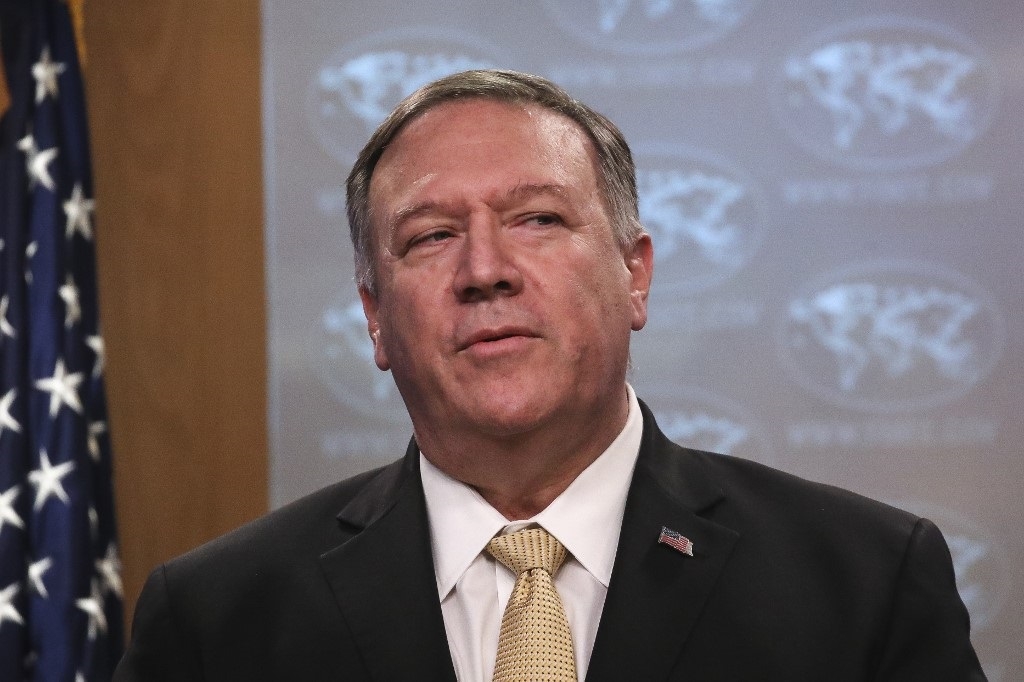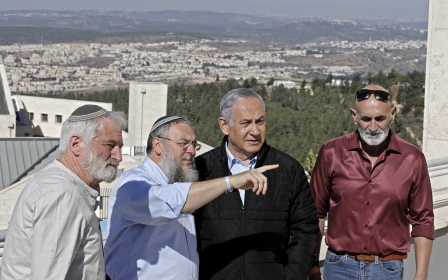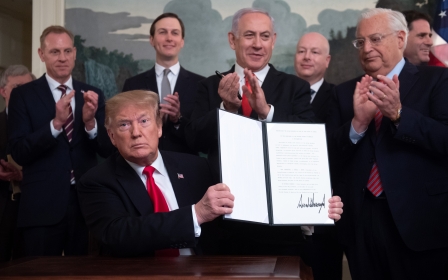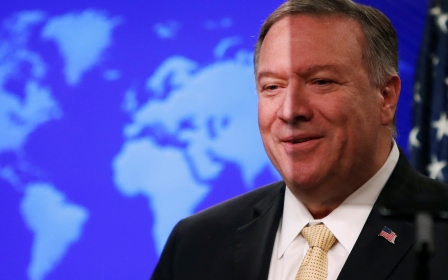Obama policy reversal? Pompeo's Israeli settlement statement, fact checked

After what he described as careful study, US Secretary of State Mike Pompeo announced on Monday that the Trump administration believes that Israeli settlement building in the occupied West Bank is not a violation of international law.
Who did the studying, how long it took and whether there were any dissenters was never spelled out, as observers pointed out; nor was the exact motivation of the announcement's timing - just two days before Israeli premier hopeful Benny Gantz's deadline to build a coalition government.
In the 15-minute statement, Pompeo proceeded to lay out a new course for US policy towards the Israeli settlements, which he said was "reversing the Obama administration's approach" and aligning itself with that of Ronald Reagan's administration.
But is it really? Middle East Eye reflects on these points and several others made by the secretary to separate fact from spin.
"The Trump administration is reversing the Obama administration’s approach towards Israeli settlements."
Pompeo kicked off his statement saying the Trump administration was “reversing” the Obama administration’s approach towards settlements, a line that many US news agencies picked up and ran with. But what exactly was Obama’s take on settlements?
In the twilight of his presidency, just weeks before Trump took office, his administration abstained - to much applause - from a UN Security Council resolution demanding a halt to all Israeli settlements in the occupied territories. As his aides told the Washington Post, Obama never had to run for office again and, finally, had nothing to lose.
Five years earlier, it had been a different story, Noura Erakat, a Palestinian human rights lawyer and legal scholar, told Democracy Now on Tuesday. In February 2011, the Obama administration used its very first veto at the UN Security Council against a resolution which condemned Israeli settlements.
Yes, said UN Ambassador Susan Rice at the time, the US rejected “in the strongest terms” the legitimacy of continued Israeli settlement building, but the resolution risked “hardening the positions on both sides”.
Certainly, Obama’s administration made Israel think twice about settlement building. Just look at the increase in building after Trump took office, described as potentially “the largest construction binge in years”.
But as Erakat points out, like all US administrations over the past five decades, the Obama administration talked out of both sides of its mouth. While abstaining on the 2016 resolution, just months earlier Obama had agreed to give Israel a record $3.8bn in US aid annually over ten years - the largest agreement of its kind between the US and any country.
“So what we are seeing now is not a sharp reversal of US foreign policy on the question of settlements and Palestine, but instead the culmination of it,” Erakat said on Tuesday.
“However, in 1981, President Reagan disagreed with that conclusion and stated that he didn’t believe that the settlements were inherently illegal . . . After carefully studying all sides of the legal debate, this administration agrees with President Reagan.”
In an interview with the New York Times in February 1981, Ronald Reagan did, indeed, say that he didn’t believe settlements were illegal, but he also said a bit more after that – and the actions of his administration were something else altogether.
A reporter had said there appeared to be an acceleration of settling in the West Bank. “Do you approve of that? And secondly, is yours an even-handed policy in the Mideast?” the reporter asked Reagan.
While Reagan said he disagreed when the administration of his predecessor Jimmy Carter had described settlements as illegal because, under a UN resolution that left the West Bank open to all people, "they’re not illegal”, he believed building them was “ill-advised”.
“I do think perhaps now with this rush to do it and this moving in there the way they are is ill-advised, because if we're going to continue with the spirit of Camp David to try and arrive at a peace, maybe this, at this time, is unnecessarily provocative,” he was quoted as saying.
Despite his comments and other public statements from officials, which refrained from taking a legal position on the settlements, US officials continued behind closed doors during his administration to say that settlements were illegal, a former legal adviser at Israel’s Foreign Ministry told the Times of Israel on Tuesday.
Reagan’s own proposal for peace in 1982 called for a freeze on both new and existing settlements. The proposal – delivered in a letter – was promptly rejected in a resolution adopted unanimously by Israeli Prime Minister Menachem Begin’s cabinet. Begin told Israel radio it was his “saddest day as prime minister”.
“The establishment of Israeli civilian settlements in the West Bank is not per se inconsistent with international law.”
While Pompeo insists that the legality of Israeli settlements was carefully studied and that, after looking at “all sides of the legal debate”, the administration has concluded that settlements are not “inconsistent with international law”, he never really explains how exactly.
He contrasts the Trump administration’s positions with past presidencies, claims that the Israeli legal system “affords an opportunity to challenge settlement activity” (allegations a Palestinian might find seriously misleading) and says calling out settlements hasn’t helped peace efforts.
But how the settlements no longer violate international law, specifically the Geneva Conventions - established after the Second World War to ensure the humane treatment of civilians during conflict – is never fully clarified in Pompeo’s statements.
Specifically, according to the Fourth Geneva Convention, an occupying power “shall not deport or transfer parts of its own civilian population into the territory it occupies”. The UN General Assembly, the UN Security Council and the International Court of Justice have all said that Israeli settlements violate the convention which both the US and Israel have ratified. So what has changed now?
And what are the consequences if international law no longer matters? Israeli human rights group B’Tselem said on Tuesday that not only will Pompeo's "farcical announcement" green-light Israel's illegal settlement project, but it also paves the way for other human rights violations around the world.
“And finally – finally – calling the establishment of civilian settlements inconsistent with international law hasn’t worked. It hasn’t advanced the cause of peace.”
Perhaps calling out settlements as illegal hasn’t advanced the cause of peace, as Pompeo said.
But neither, arguably, has recognising Jerusalem as the capital of Israel and Israeli sovereignty over the Golan Heights; cutting funds to the United Nations Relief and Works Agency (UNRWA), the UN body that delivers aid to more than five million Palestinian refugees; closing the PLO office in Washington DC; or pushing a "deal of the century" which marginalises half the parties to who its meant to bring resolution.
On the day the Trump administration opened its new embassy in Jerusalem alone, on 14 May 2018, 68 people in Gaza were either killed or suffered from fatal injuries to which they would later succumb, protesting against the move in the Great March of Return.
"It was a black day in Palestinian memory," Dr Medhat Abbas, the director of Al-Shifa Hospital in Gaza City which treated around 500 wounded people on that day, told Middle East Eye.
How actions the Trump administration has taken since inauguration day have protected “the security and welfare of Palestinians and Israelis alike”, as Pompeo urges both sides to do, is something he also fails to clarify.
Middle East Eye propose une couverture et une analyse indépendantes et incomparables du Moyen-Orient, de l’Afrique du Nord et d’autres régions du monde. Pour en savoir plus sur la reprise de ce contenu et les frais qui s’appliquent, veuillez remplir ce formulaire [en anglais]. Pour en savoir plus sur MEE, cliquez ici [en anglais].





